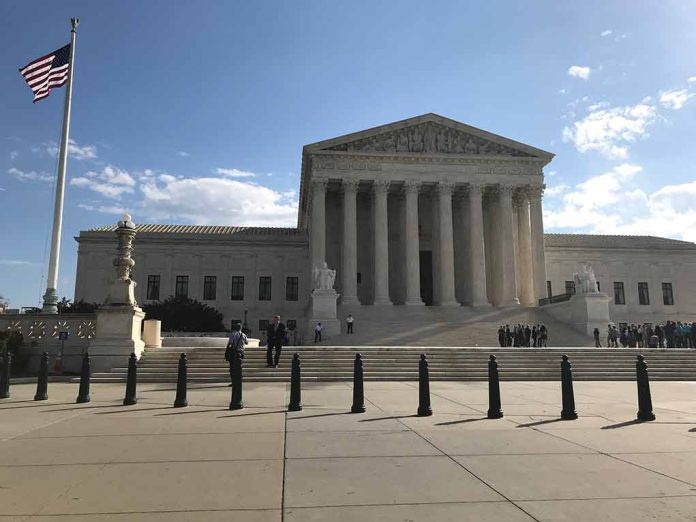
Supreme Court Justice Amy Coney Barrett’s unexpected stance on ghost guns has stirred controversy in the ongoing Garland v. VanDerStok case, potentially shifting the landscape of gun control debates.
At a Glance
- Justice Barrett showed openness to stricter regulations on ghost gun purchases
- The Supreme Court may uphold Biden’s ghost gun regulation
- Law enforcement seizures of ghost guns increased from 1,600 in 2017 to over 19,000 in 2021
- The case focuses on the ATF’s authority to regulate ghost gun kits under federal law
Barrett’s Surprising Stance
In a surprising turn of events, Supreme Court Justice Amy Coney Barrett, known for her conservative leanings, has signaled a potential departure from traditional right-wing positions during the Garland v. VanDerStok case. This case, centered on the regulation of “ghost guns,” has revealed an unexpected twist in the ongoing debate over gun control in America.
Barrett’s openness to stricter regulations on ghost gun purchases, including mandatory licenses for buyers, aligns with an evolving judicial understanding that leans towards tighter controls on these untraceable firearms. This stance builds on her previous rulings upholding domestic violence statutes that limit gun access for individuals under restraining orders, setting her apart from typical conservative interpretations of the Second Amendment.
The Ghost Gun Debate
Ghost guns are do-it-yourself kits that allow users to quickly assemble functional firearms without serial numbers, raising concerns about traceability. The Biden administration’s regulation aims to treat these kits like regular firearms, requiring serial numbers, licensed dealers, and background checks. Law enforcement seizures of ghost guns have skyrocketed in recent years, prompting this regulatory response.
“At one point, Barrett said one of their arguments sounded ‘a little made up.'”
The legal question at hand is whether the Bureau of Alcohol, Tobacco, Firearms and Explosives (ATF) has the authority to regulate these kits under federal law. This focus on the power of federal agencies, rather than Second Amendment rights, has become the crux of the debate.
Supreme Court’s Potential Ruling
Chief Justice John Roberts and Justice Amy Coney Barrett may vote to uphold Biden’s regulation on ghost guns, having previously sided with the government in earlier litigation on regulating ghost gun kits. The Supreme Court previously approved the regulation temporarily with a 5-4 split, indicating a potential inclination to uphold it in the final ruling.
“Responding to the challengers’ contention that ghost gun kits are for hobbyists, U.S. Solicitor General Elizabeth Prelogar called that ‘a questionable proposition, given that if it only takes 20 minutes, the hobbyist is probably not going to get his money’s worth and won’t actually have the experience of building a gun.'”
While challengers argue that most crimes are committed with traditional guns and that the kits are difficult to assemble, the government contends that the regulation is within the ATF’s authority, citing evidence of an increase in crimes committed with ghost guns. The outcome of this case could set a precedent for future firearm regulations and Second Amendment interpretations.
Implications for American Gun Rights
Barrett’s evolving stance could significantly influence future judicial attitudes toward gun regulation in the United States. As the Supreme Court navigates this complex issue, Americans must stay informed about potential changes to gun laws and their impact on Constitutional rights. The tension between individual rights and public safety concerns in firearm legislation remains at the forefront of this debate.
Supreme Court hears case on Biden administration's ghost gun law | Click on the image to read the full story https://t.co/IhPk1TFugC
— WLWT (@WLWT) October 8, 2024
As the Supreme Court continues to hear arguments and deliberate on this case, the future of ghost gun regulation and broader implications for firearm control in America hang in the balance. The final ruling will undoubtedly have far-reaching consequences for gun owners, manufacturers, and law enforcement agencies across the nation.
Sources:
- John Roberts and Amy Coney Barrett could vote to uphold Biden’s ‘ghost guns’ regulation
- Supreme Court seems open to upholding regulations on ghost guns, hard to trace weapons used in crime
- Amy Coney Barrett on Guns
- Supreme Court leans toward upholding Biden’s ‘ghost gun’ crackdown
- Barrett’s Omelet Question on Ghost Guns Is Telling
- Divided Supreme Court allows ‘ghost gun’ rule to take effect






